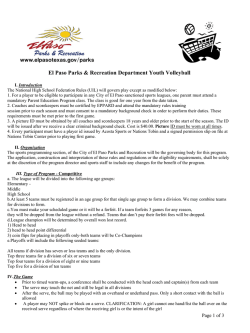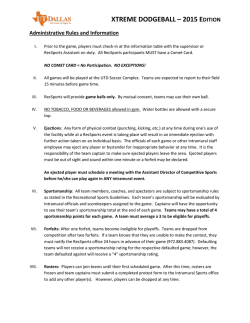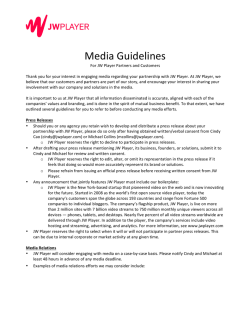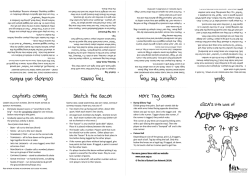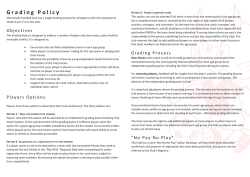
Alpha Draft — Feedback Appreciated
Innocence a storytelling game You're reading an alpha draft of this game. It has been edited for clarity, grammar and mechanical consistency, but little attention has been paid to presentation and aesthetics. If you have any thoughts or comments, please send them to [email protected]. Any and all feedback is appreciated. Thanks for playing. © Misery Tourism Games, 2015. All rights reserved. Copying and distribution of this text is fine, but all copies must contain this copyright notice and the Misery Tourism Games website address, included below. www.miserytourism.com “Our first words are fiction,” he told me, smirking as he jangled his handcuff chains. “We don't know what a 'Mama' is and we don't know our Dada from a dadaist. We're creating our parents as we name them, and in that first word we're already perverting them to meet our expectations, our needs and desires. That first word is a request or a demand, and never anything else. Even God created the universe with words. Even He is a liar. Even He only knows what He says He knows. And you're asking me if I did it? And you expect the truth, and nothing but?” - Grigory Kozlov, Notes on an Interrogation (transl. F. H. Barrett) Inspired by films like Rashomon and fiction's many unreliable narrators, Innocence is a game about how the perspective of the storyteller shapes the story told. In the game, multiple narrators will tell their version of a contentious event—an event in which they have a personal stake, and about which they have every reason to lie, even to themselves. What You'll Need ➔ Three or more players. Keep in mind that the more players you have, the longer the game will be. Once you have more than six people at the table, you might want to consider penciling in a time for an intermission. ➔ Paper or index cards. You'll be writing a lot, so make sure that you have a big stack of paper or index cards handy. If you're using standard size sheets of paper, you may want to tear the paper into smaller scraps in advance. Make sure that each scrap is big enough to hold one or two simple sentences. ➔ Something for each player to write with. Pens, pencils, colored pencils, crayons, it doesn't matter, just as long as there are enough to go around. ➔ A hat or bag or some other container to use for random draws. All you really need is a container that players can draw folded cards or scraps of paper from at random. As long as the players can't see what they're about to draw in advance, you'll be fine. The Premise Before you begin, you'll need to decide what kind of story your group wants to tell. For the purposes of Innocence, this is your premise. Don't worry. There's no need to plot out your entire story in advance. You don't need to decide who the primary character are, what they want, or where the story is going. In fact, please don't even ask those questions. They'll be addressed naturally in play, and if you pin them down now they will only become a narrative straightjacket later. Instead, your group should come up with a brief, general description of the situation at the heart of the story you'd like to tell. When you're brainstorming, try to find a situation that will lend itself to multiple conflicting interpretations. This isn't hard—pretty much any event, large or small, can give birth to a contentious debate—but if you're looking for inspiration, try to imagine a newspaper headline (The New York Times or tabloid trash, it doesn't matter). The stories that make the news are often compelling exactly because they're contested; the fact that they lend themselves to interpretation and speculation is what makes them infectious. A debate is like a disease. The more adaptable it is, the faster it spreads. These stories often have a few themes in common: murder, politics, relationships (romantic or otherwise), identity (ethnic, sexual, political, you name it), and money (or social class). Once your group starts talking about these topics, you're bound to stumble on a subject that interests you—if a fight doesn't break out first—and a premise should follow naturally. All of the players should agree to the premise before you move on. This is one part of Innocence where consensus is necessary. You don't need to write down your premise. In fact, it's better if it's discussed and understood, but not put into writing. This will keep it fluid in the players' imaginations. That said, here are some sample premises, in writing, because we're all a slave to our medium: ➔ A suburban family in the midst of a messy divorce. ➔ Murder on a 19th century British country estate, where both the aristocrats and the staff are implicated. ➔ An unarmed black teenager is dead, killed by a white authority figure. ➔ Strange lights have been appearing over a rural Mississippi town, but no two witnesses have seen exactly the same thing. ➔ A routine dungeon crawl goes terribly wrong for a group of adventurers, the princess is dead, and now someone is going to have to take the blame. The Narrators Once you have your premise, the next step is to create the characters who will turn that premise into a series of contradictory stories. These are your narrators. The narrators are the central characters in Innocence and much of the game will unfold through the lens of their conflicting perspectives. In order to create your narrators, first give each player two scraps of paper (or two index cards) and set the hat (or whatever) in the middle of the table. One player—it doesn't really matter who. Ideally it will be the one with an idea.—then writes a short description of a character on one of their papers and places it in the center of the table. The description does not have to be a full sentence and should not be longer than one simple sentence. For example, if your premise is the Victorian murder mystery, “Lord Henry Wilkinson, owner of the estate” would work perfectly, but “Lord Henry Wilkinson, who owns the estate, abuses his staff, fought heroically in the Crimean War, and who has eight children and an opium addiction” is a bit much. You want to give Lord Henry's player(s) something to work with, but you don't want to dictate the entire character in advance. That said, feel free to use a couple adjectives or a short descriptive phrase; you can even hint at a character's flaws, as long as you don't put anything that could seriously prejudice play against a character. “Officer Tammy Johnson, alcoholic beat cop” is cool, but “Officer Tammy Johnson, who shot that poor kid in cold blood” is never going to get a fair trial (though the case might still be thrown out by the grand jury). The character should, of course, be inspired by your premise. Although it need not be slavishly so. If your premise is the fatal shooting of an unarmed black teenager, every narrator does not need to be a law enforcement officer or a member of the teen's family or community. Maybe a group of high school students from an upstate prep school in the city on a field trip got off on the wrong subway stop, and one of them thinks she saw everything. That said, an extraterrestrial who watched the events unfold on the telescreen in his spacecraft might be a bit too far out of left field. Or maybe not. If your group greets the idea with enthusiasm instead of incredulity, who am I to judge? Certainly the spaceman would have a unique perspective on American race relations. Once you've written a narrator's description on your first scrap of paper and placed it in the center of the table, copy the description word-forword on your second scrap, fold it, and place it in the hat. Then, going counter-clockwise around the table, each other player should do the same: they should come up with a narrator, describe them in a few words, write the description on two scraps of paper, and place one scrap in the center of the table and the other in the hat. When coming up with new narrators, try to adds characters whose point of view is likely to be in conflict with those of the existing narrator(s). If all of the narrators share a similar background and perspective, you're not likely to end up with an interesting game. So if Lord Henry Wilkinson is already on the table when it's your turn to create a narrator, you might want to opt for a disgruntled footman or a visiting German heiress who is infatuated with the writings of that Marx fellow, rather than Wilkinson's younger brother, who is also a conservative and Crimean War vet. The Facts Now that each player has contributed a narrator, it's time to establish a few material facts of the situation. Material facts are the objective truths of the scenario that are not open to interpretation, or, at least, they're accepted details that no one involved is interested in arguing. It may be a fact that Lady Wilkinson's death was the result of rat poison in her Earl Grey, that the princess was in the custody of a black dragon, or that the average resident of the Mississippi town where the UFOs were sighted lives well below the federal poverty line. Facts are established similar to narrators. Each player should take another slip of paper. Beginning with the player who chose the first narrator, and proceeding counter-clockwise around the table, each player should write down one material fact and place it in the center of the table, leaving some space between the narrators and the facts. Facts should consist of a single, brief statement (no more than a short sentence or two) and they should be written as objectively as possible. They shouldn't attempt to offer interpretations for events or explain characters' motivations. So if the premise is a suburban divorce and one of the narrators is “Nathaniel Diaz, husband and high school math teacher,” one of the facts could be “Nate had a sexual encounter with one of his students,” but not “Nate slept with a student, because he was feeling neglected at home” or “Nate banged a junior because he's a total horndog.” Note that the fact that Nate had an affair with a student at all will almost certainly end up reflecting more poorly on him than his spouse, so it's not necessary that facts be truly neutral, just that they not be speculative. Or, in other words, the facts should say what, where, or when, but never why. If any player feels a fact is not objective enough as written, they should explain why, and ask the player contributing the fact to rewrite it. They shouldn't ask that the fact be thrown out entirely, just that it be edited to make it less speculative or subjective. This can happen any number of times, and should happen until all the players agree on all of the facts. Narration Once you have your premise, narrators, and facts, all of the preparatory nonsense is over and it's time to start telling the story. The player who contributed the first narrator and the first fact should reach into the hat and draw one of the slips of paper, and then begin telling what happened from the perspective of the narrator who they drew. They should begin to narrate their story in the first person, as if they were explaining the events to an audience, an investigator, or some other third party. If your premise involves a crime, imagine that you're sitting in the interrogation room, giving the police your version of events. Or perhaps you're telling your lawyer or marriage counselor why you think your marriage is failing (or why it's already too late to save it). Or maybe your audience is just the audience, an invisible spectator, listening to the voice in your head as you justify and explain what you did to yourself. Either way, the audience won't talk back. There won't be an outside check on your character's perspective, so feel free to say exactly what you think they believe happened. At any point during your narration you can ask any of the other players to join the story and play the role of any other character that you wish. This could be one of the other narrators, or it could be anyone else that you need to convey your character's version of events. When you do this, turn to one of the players, tell them which character you want them to play, and narrate their introduction into your story. You can use these characters to dramatize the scenes as you describe them. Or, in other words, the other players can join you to act out scenes from the past, as you describe them. When this is happening, feel free to slip between narrating events and reenacting them at will. You can also give instructions to other players to shape the way they portray their characters. For example, if you're telling the story from the perspective of Nate's wife, Joy Diaz, and you're in the midst of playing out an argument between the couple, and Nate's player is acting calm and reasonable, you might say “He was angrier than that” or “He was starting to lose his temper” so that they know to take it up a notch. Or you might signal the shift in tone by talking about your character's response to his behavior, like “For the first time since I met him, I was afraid he might hit me,” or “I started to worry about my safety.” When you're narrating, you're directing the show, so don't be afraid to tell the other players what you want to see. When you're narrating, try your best to stay true to the facts you've established. You can use them to frame your story, or turn to them for inspiration if you get stuck. You can gloss over facts that might show your character in a poor light, but don't contradict them entirely. Remember, these are things that all of the characters know happened (or admit happened). Facts are facts not so much because they're true as because they're not contested. Once you've told your character's whole story—or as much of it as you think they'd want to tell—let the other players know you've finished and pass the hat to the person on your right. They should draw a narrator, and then tell their side of the story, just as you did, using your version as a foundation, but deviating from it whenever or however they wish. They can also bring in other players to play narrators and other important characters, just as you did. Also, they are under no obligation to have the same players portray they same characters. In fact, sometimes it'll be best to bring in a different player to portray a character to better reflect the narrator's point of view. In the case of the shooting of an unarmed teenager, the playing narrating for his friend might ask the most softspoken person at the table to play the shooting victim, while the player telling the cop's side of the story might chose the biggest, loudest player available. This means characters, including the narrators, are likely to change dramatically from one telling to another—and this is exactly as it should be. The hat (and the narrative) should pass from player to player until there are no narrators left and all of the players have had their moment in the limelight. Speculation While you're listening to (or participating in) a narrator's story you will inevitably be questioning their version of events and drawing your own conclusions, if only because doing so is often as involuntary as any human reflex. You'll notice narrative inconsistencies, catch unusual details, make inferences about characters' behavior, and otherwise endorse or call bullshit on their story. When you catch yourself doing this, write your thoughts, in the form of a sentence or two, on a scrap of paper. Decide which narrator or fact your note is most relevant to, and place the scrap of paper on the paper for that fact or narrator. So while Jack Lloyd, disgruntled footman, is listing the injustices he's suffered at the hands of Henry Wilkinson, you might write “Lord Henry holds his staff in contempt” and place it on top of the scrap for “Lord Henry Wilkinson.” If you don't buy Jack's sob story and you think he's trying to make Henry look cruel to deflect suspicion for the murder away from himself, you might instead write “Jack is too desperate for sympathy and it's suspicious” and attach that note to Jack's paper. Similarly, if one of your facts is “Lady Wilkinson's tea was laced with rat poison,” and you discover that Mr. Lloyd has been having a fling with one of the kitchen hands, you might put a note on the fact that reads “Jack knew someone who could have provided the poison.” You can add a note to a narrator or fact at any time, and you can add as many as you like during any particular character's narration. These notes can be as plausible or implausible as you like, and are not subject to approval from the other players. Some notes will inevitably contradict each other, and some are bound to be borderline insane. That's fine. That's how it works when everyone has an opinion. However, narrators may not add notes during their own narration. The notes are necessarily speculation twice removed from reality. They're interpretations of an interpretation. But what the narrator can do is introduce a new fact. They can do introduce the fact at any time during their narration, but they can only introduce a single new fact during their turn as narrator. As with the facts created at the beginning of the game, this fact must be written as objectively as possible and is subject to the other players' approval. As before, any player or players can ask the narrator to rewrite the fact until they feel that it's objective. The Final Witness After all of the narrators have finished their stories, you're likely to be left with more questions than answers. You've just heard several biased, self-interested versions of what happened, and there's likely no easy way for you to tell which, if any, accurately reflect reality. Maybe every word spoken so far has been nothing but a delusion or a lie, or maybe everyone has told a little truth, at least in those places where it happened to overlap with their interests and beliefs. Who can say? Luckily, there's one more person with a story to share, someone who might have seen more than the others, or who might have less reason to lie about what they saw. This is the final witness. The final witness will serve as the game's last narrator. They should be someone who can offer a unique (and perhaps clearer) perspective. They may be an outsider who just happened to have a ringside view to the story's most important events, allowing them to remain objective while also privileging them with information hidden to other characters. If there was a murder, maybe they're a hapless foreign dignitary and party guest who just happened to stumble into right rooms at the right times to hear and see the murderer at moments when he was implementing his plans or explaining his motives. In the case of a suburban divorce, the witness might be a marriage counselor who has spent time with the couple and has insight into their actions that they do not—or it may be their babysitter, assuming Nate didn't seduce her too. Whoever you choose, they should have some claim to objectivity that previous narrators did not. However, they don't need to be completely objective. This is still a fallible human, after all. They just happen to be privy to exclusive information, or the stakes are lower for them, so they have less reason to lean on defense mechanisms and self-serving justifications. But they may still bring their own prejudices and misinterpretations to the story. In order to determine the identity of the final witness, count the number of speculative notes that have been attached to each of the narrators. The player of the narrator with the fewest notes gets to decide who the witness will be. They can select a character that has already appeared in one or more of the narrators' accounts, or they can create someone completely new, but, of course, they cannot use one of the existing narrators. Meanwhile, the player of the narrator who was given the most notes can look through all of the subjective notes, including both those on narrators and those on facts, and choose one to be discarded. This note gets thrown out and its contents won't be addressed by the final witness's story. Once you've established who your final narrator will be, the players will take turns telling the story from the narrator's perspective, addressing all of the remaining notes as they do. Starting with the player who narrated first and proceeding counter-clockwise around the table, each player should pick up a note and tell part of the story from the final narrator's perspective that addresses that note. The final witness's player can address their chosen note however they wish, as long as their narration is at least loosely tied to the note's contents. They can affirm what the note says (“Yes, Officer Johnson had been drinking before the shooting. She came into my shop to buy a coffee, and I watched her sweeten it with a bottle of jack. I could smell the booze on her breath when I handed her change for a twenty.”) or they can refute it (“No, Nate wasn't using that student for sex. You should have heard the way he talked about her in our sessions. The man was in love. Sick in love.”). They can also refer to the note more obliquely, leaving the truth open to interpretation (“Was Henry cruel to the help? Oh, I couldn't say. The old boy certainly had a sense of humor, I will tell you that much. Quite the practical jokester. And that poor footman— Jack, was it?—he certainly caught the brunt of it.”). Once you've finished addressing a note, discard it. The next player should pick a note that they'd like to resolve, and start narrating, remaining in character as the final witness. Continue to go counterclockwise around the table, picking up notes and narrating responses to them, until all of the notes have been addressed. When there are no notes left, there's nothing more to tell, and the game is over. If you're still not satisfied that you have found out the truth, too bad. You'll have to live with the mystery. Or you can console yourself with the notion that it's all fiction, after all, and whatever you believe happened, happened.
© Copyright 2026
